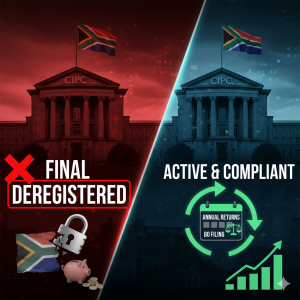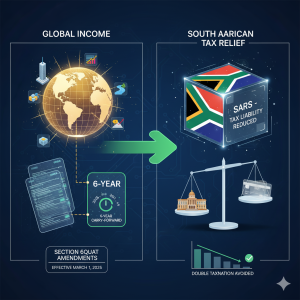URGENT WARNING: The Catastrophic Impact of CIPC FINAL Deregistration

A company’s failure to maintain its statutory compliance, primarily the filing of Annual Returns for two or more successive years, triggers an administrative process that leads to the complete and immediate withdrawal of its legal status by the Companies and Intellectual Property Commission (CIPC).
The status of “Final Deregistered” is not merely a formality—it is a catastrophic event that instantly strips the business of its legal identity and triggers severe financial and legal liabilities.
- The Immediate Loss of Legal Personality
Final deregistration under the Companies Act (No. 71 of 2008, Section 82(3)) has immediate and devastating legal consequences:
- Cessation of Existence: The company or close corporation (CC) is removed from the CIPC register and legally ceases to exist as a separate juristic person (CIPC).
- Invalid Contracts: Any contracts, agreements, or transactions entered into by the company after the final deregistration date may be deemed void (CIPC). This exposes the directors to risk and can lead to financial losses with clients and suppliers.
- Frozen Banking: Financial institutions (banks) are notified and typically freeze the company’s bank accounts, immediately halting operations and cash flow (CIPC).
- Assets are Forfeited to the State (Bona Vacantia)
This is arguably the most severe financial consequence for the business:
- Forfeiture of Assets: All the company’s assets—including immovable property (land, buildings), bank balances, and intellectual property—are automatically transferred to the State as bona vacantia (ownerless goods) (CIPC).
- Loss of Creditor Enforcement: While a company’s debt is not extinguished by deregistration, creditors lose the immediate ability to enforce those debts against the now-non-existent entity (CIPC).
- Personal Liability for Directors and Members
Deregistration does not end the liability of the individuals who governed the entity.
- Continuing Liability: The liability of any former director or member for any act or omission that took place before deregistration is unaffected and continues (CIPC).
- Reckless Trading Risk: Directors who knowingly allowed the company to trade or accrue debt while non-compliant or undergoing deregistration risk being held personally liable for the company’s debts (CIPC). This can also extend to common law actions for reckless or fraudulent trading.
- Notification Failure: The CIPC sends warnings to the registered contact details of directors/members. Failure to receive these due to outdated contact information is the responsibility of the director, not the Commission (CIPC).
Reinstatement: An Expensive and Uncertain Process
While reinstatement is possible, it is not guaranteed and requires a significant administrative effort.
| Reinstatement Requirement | Practical Impact |
| Proof of Economic Value | The company must provide sufficient documentary proof (e.g., bank statements covering a period before and after deregistration) that it was in business or had assets at the time of final deregistration (CIPC). |
| Clearance of Backlog | All outstanding Annual Returns, associated fees, penalties, and the latest Beneficial Ownership (BO) declaration must be filed and paid (CIPC). |
| Process Length & Cost | The process is complex, involves a dedicated application (Form CoR 40.5), a non-refundable application fee (R200.00 as of the latest guide), and is time-consuming (CIPC). |
CRITICAL NOTE: If a company was not in business or held no economic value at the time of final deregistration, CIPC will reject the reinstatement application. The only recourse is to register a new entity (CIPC).
Directors and business owners must check their status on the CIPC register immediately and resolve all Annual Return and Beneficial Ownership arrears to prevent the catastrophic event of final deregistration.
Navigating the New Landscape: VAT on Low-Value Imported Goods in South Africa

The South African Revenue Service (SARS) has been steadily reforming its customs import system for e-commerce, and recent changes, particularly concerning Value-Added Tax (VAT) on low-value imported goods, are set to significantly impact businesses across the country. These amendments are driven by SARS’s commitment to fostering fair competition and ensuring legitimate trade within the rapidly growing e-commerce sector.
The Key Change: No More VAT-Free Low-Value Imports
Historically, a concession existed where certain imported goods valued at less than ZAR 500 were exempt from VAT, and a flat rate of 20% was applied in lieu of Customs duties. This effectively created a loophole that favoured foreign e-commerce sellers, allowing them to bring low-value parcels into South Africa without the standard 15% VAT that local businesses are required to charge.
SARS has officially closed this loophole.
- Interim Implementation (from 1 September 2024): SARS began implementing changes whereby VAT was introduced in addition to the 20% flat rate Customs duty for these low-value consignments. This marked the practical end of the VAT exemption.
- Formalisation and Reconfiguration (from 1 November 2024): The customs system was further reconfigured to align with the World Customs Organization’s (WCO) Guidelines on Immediate Release.2 This involves categorising goods for duty purposes into distinct categories, ensuring appropriate duties are applied alongside the now-standard 15% import VAT on all goods, regardless of their value.
- Legislative Finalisation: While SARS has implemented these changes through Customs directives, the formal legislative amendments to the VAT Act to permanently remove the de minimis threshold will be tabled in upcoming tax bills for parliamentary approval, solidifying these changes into law.
In essence, all imported goods, even those of low value, are now subject to the standard 15% import VAT.
How Local Businesses and SMEs Will Be Affected
These changes bring both opportunities and challenges, particularly for South African small and medium-sized enterprises (SMEs) and other local businesses.
For Local Retailers and Manufacturers (Selling Locally Sourced Goods):
This is largely good news for businesses that primarily source and sell goods within South Africa.
- Level Playing Field: The most significant benefit is the creation of a more equitable competitive environment. Local businesses have long argued that they were unfairly disadvantaged by foreign e-commerce platforms that could offer goods at lower prices because their imports were VAT-exempt. With VAT now uniformly applied to all imports, local businesses can compete on a more level playing field, potentially seeing an increase in local demand.
- Increased Consumer Confidence in Local Products: As the price differential narrows, consumers may be more inclined to support local businesses, knowing that the price reflects a fairer tax application across the board.
For E-commerce Entrepreneurs and Small Businesses (Importing Goods for Resale):
These businesses will experience the most direct and immediate impact.
- Increased Landed Costs: The cost of importing goods, particularly those previously benefiting from the ZAR 500 exemption, will increase by the 15% import VAT, in addition to any applicable customs duties and handling fees. This directly impacts your cost of goods sold.
- Pricing Strategy Adjustments: Businesses will need to review and likely adjust their retail pricing strategies. You will need to decide whether to absorb some of these increased costs, pass them entirely to the consumer, or find a balance. Clear communication with customers about these new costs (e.g., in product listings or checkout) will be crucial.
- Enhanced Administrative Burden: While SARS aims for a simplified clearance system, managing and reconciling the 15% import VAT on potentially numerous small consignments will add an administrative layer. Businesses need robust financial systems to track these costs accurately for tax purposes and cash flow management.
- Supply Chain Review: It may be an opportune time for importing SMEs to review their supply chains. Are there local alternatives that are now more competitive? Can bulk imports reduce per-unit costs and administrative overheads, even with the new VAT?
- Cash Flow Implications: Paying 15% VAT upfront on all imports will impact cash flow. Businesses need to plan for this increased outlay, especially for high-volume imports.
Navigating the New Terrain
These changes underscore the importance of accurate financial planning and robust accounting practices. Businesses, especially SMEs, should:
- Review your product costing models to accurately account for the new import VAT.
- Engage with your logistics and customs clearing agents to understand their updated processes and any new fees.
- Communicate transparently with your customers about any necessary price adjustments.
- Consult with a financial advisor or chartered accountant to ensure full compliance and to strategically assess the impact on your business’s profitability and cash flow.
SARS’s actions are a clear signal of its intent to modernise the tax system for the digital economy. While challenging for some, these changes ultimately aim to create a more equitable and sustainable trading environment for all businesses in South Africa.
The New Normal for Foreign Tax Credits: Key Section 6quat Changes (South Africa)

South African taxpayers with foreign income or investments will benefit from crucial amendments to Section 6quat of the Income Tax Act, which provide greater relief against international double taxation. These changes, primarily focused on the carry-forward of unused credits and the treatment of foreign capital gains tax, are effective from March 1, 2025 (the start of the 2026 year of assessment for individuals).
Part 1: Detail of the Section 6quat Amendments
- Introduction of the Foreign Tax Credit Carry-Forward (Up to 6 Years)
This is the most significant change, moving away from the “use-it-or-lose-it” system:
| Aspect | Pre-March 1, 2025 | Post-March 1, 2025 |
| Treatment of Unused FTCs | Any foreign tax credit (FTC) that exceeded the South African tax liability for the year was generally lost. | Unused FTCs can be carried forward automatically by the South African Revenue Service (SARS). |
| Carry-Forward Period | Not applicable. | The unused credit can be carried forward for up to six subsequent years of assessment. |
| Applicability | Affects companies from the 2025 tax year and individuals/trusts from the 2026 tax year (commencing March 1, 2025). |
This amendment ensures that taxpayers will be able to fully utilize foreign taxes paid, even if South African taxes on that income are lower or if the income fluctuates between tax years.
- Full Utilisation of Credits on Foreign Capital Gains
The legislation has been modified to address the calculation of FTCs on foreign capital gains:
- The Change: Taxpayers are now permitted to fully utilise foreign tax credits for the taxes paid on capital gains in a foreign jurisdiction.
- The Benefit: This eliminates the previous restriction where the FTC for capital gains was limited only to the portion of the foreign tax credit attributable to the taxable portion of the gain (i.e., the portion included in South African taxable income).
This means the FTC can be used to the same extent for the taxes paid in South Africa on the same gains, providing fairer double tax relief.
Part 2: Compliance Steps for Taxpayers
The carry-forward mechanism is largely automated by SARS, but taxpayers must ensure correct disclosure and retention of records to benefit fully.
| Compliance Step | Action Required by Taxpayer | Rationale for Compliance |
| 1. Accurate Return Submission | Fully and accurately declare all foreign income and the corresponding foreign tax paid in the relevant section of the ITR12 (for individuals) or ITR14 (for companies) tax return. | SARS’s system relies on this input to correctly calculate the Section 6quat credit and the six-year carry-forward amount automatically. |
| 2. Documentation | Retain verifiable proof of foreign tax paid (e.g., foreign tax assessments, official tax receipts, or tax certificates). | In the event of a SARS verification or audit, this documentation is essential to prove the claim and prevent the disallowance of the credit. |
| 3. Assessment Review | Carefully review the Notice of Assessment (ITA34) received from SARS. | Ensure the correct FTC has been applied and that the unused foreign tax credit balance has been correctly carried forward and reflected on the assessment. |
| 4. Tax Residency Status | Verify current tax residency status in South Africa, especially for expatriates. | The entire Section 6quat mechanism only applies to South African tax residents taxed on their worldwide income. |
Final Note
These amendments, effective from March 1, 2025, significantly improve the South African tax system’s relief for double taxation, particularly for international investors and those with sporadic foreign capital gains. Taxpayers are encouraged to consult a tax professional for assistance with complex international tax matters.
